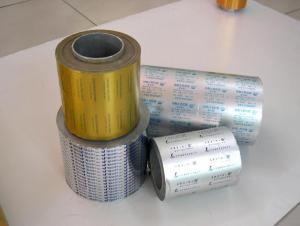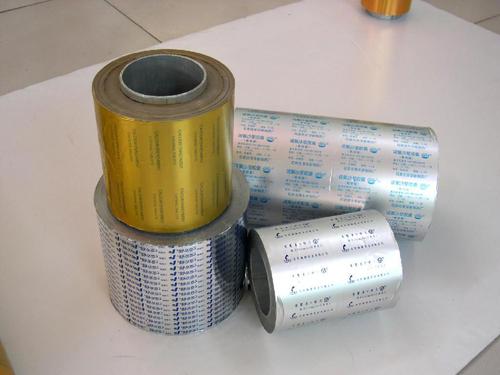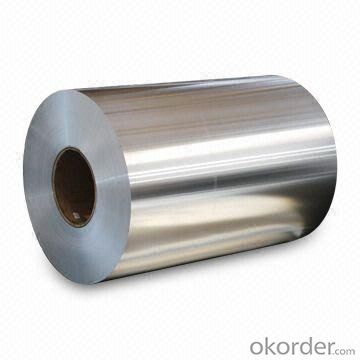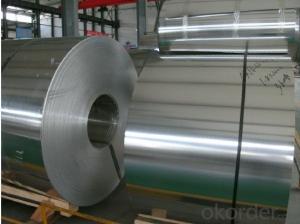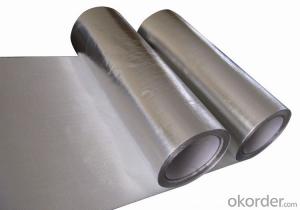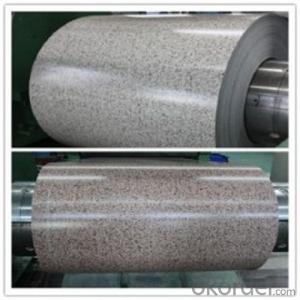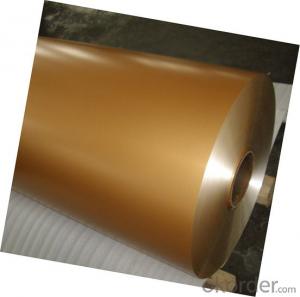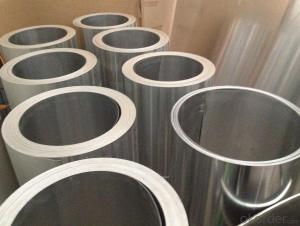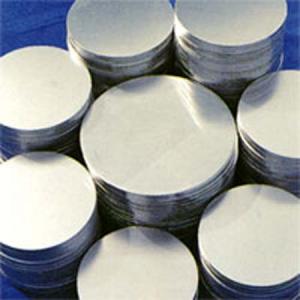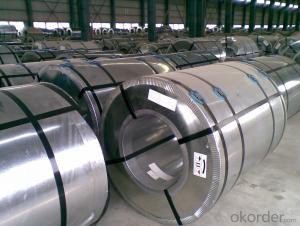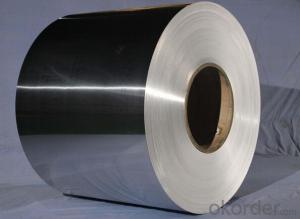Hvac Aluminum Coil - Aluminium Coil and Sheet Manufactured in China
- Loading Port:
- Shanghai
- Payment Terms:
- TT or LC
- Min Order Qty:
- 5 m.t.
- Supply Capability:
- 9000 m.t./month
OKorder Service Pledge
OKorder Financial Service
You Might Also Like
Aluminium is a relatively soft, durable, lightweight, ductile and malleablemetal with appearance ranging from silvery to dull gray, depending on the surface roughness. It is nonmagnetic and does not easily ignite. A fresh film of aluminium serves as a good reflector (approximately 92%) of visible light and an excellent reflector (as much as 98%) of medium and far infrared radiation. The yield strength of pure aluminium is 7–11 MPa, while aluminium alloys have yield strengths ranging from 200 MPa to 600 MPa. Aluminium has about one-third t,e density and stiffness of steel. It is easily machined, cast, drawn and extruded.
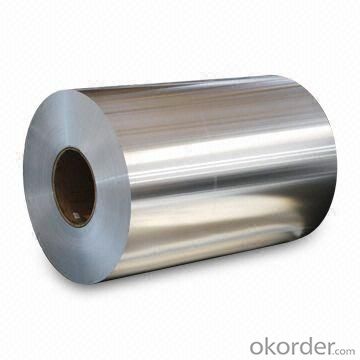
Product Name: Aluminium Coil and Sheet
What are the Specifications of our aluminum coils?
Alloy | 1060,1050,1350,1200,1100,2024,3003,3105,3004,3104,4004,5052,5182,5083,5754,6061,7075, 8011 |
Temper | O, H12, H14, H16, H18, H19, H42, H44, H46, H48,and so on. |
Width | 20-2800mm |
Thickness | 0.2 to 10mm |
Core Inner Diameter | 75mm, 150mm, 505mm Customized requirements are accepted |
Roll Diameter | 2800mm max |
Surface | Bright and smooth surface, without any defect |
Packing Detail | Packing material: Wooden pallet +paperboard +steel strip Packing style: Eye to wall; Eye to Sky Customized requirements are accepted |
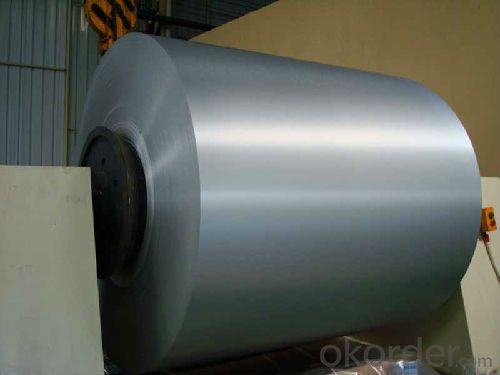
Shipping
1. Batch goods:By Sea, LCL or FCL |
2.Sample: FedEx/DHL/UPS/TNT, Door-to-Door |
3. Delivery Time: 15-25 days for batch goods; 3-7 days for samples; |
4. MOQ: 1 MT |
Payment Terms
Payment: T/T, L/C |
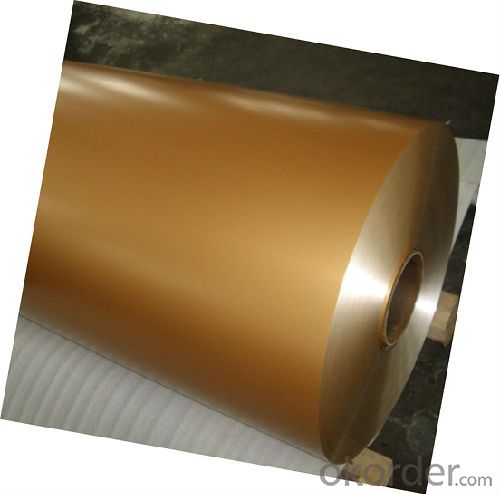
- Q: Are aluminum coils suitable for architectural roofing systems?
- Yes, aluminum coils are suitable for architectural roofing systems. Aluminum is a popular choice for roofing due to its numerous advantages. Firstly, aluminum is lightweight, which makes it easier to handle during installation and reduces the load on the building's structure. Additionally, aluminum is highly durable and corrosion-resistant, making it a long-lasting option for architectural roofing systems. It also has excellent thermal properties, reflecting heat and reducing energy consumption. Moreover, aluminum coils can be easily shaped and formed into various profiles and designs, allowing for flexibility in architectural styles. Lastly, aluminum is a sustainable material as it is recyclable, making it an environmentally friendly choice for roofing systems. Overall, aluminum coils are a suitable and practical option for architectural roofing systems, providing durability, versatility, and energy efficiency.
- Q: Aluminum reacts with water so why is it used in buildings and cooking??Some help by today would be good!! :DThanxx
- The reason aluminum can be used for both building and cooking, even though is is a reactive metal (highly reactive) that reacts to water and corrodes, is because the aluminum reacts with water and dissolved oxygen (which must be present to cause oxidation) and forms a sort of oxide film which serves to protect the aluminum against further deterioration. The way this words is very complex and has to do with the purity of the water and/or it's PH level. In this way aluminum corrodes very slowly, or not at all, depending on the conditions. It is not a very good material for cooking vessels by itself because of its reactivity. For instance it will react with acidic foods and can turn them brown, etc. Plus it gets that nasty rough surface coating. But it has excellent heat retention/distribution which is why it is used in steel-clad cookware, so that the outer surface that comes into contact with the food is stainless steel which is non-reactive but the inner sandwiched layer is aluminum which gives much better cooking performance than stainless steel, which if used alone is a very bad material for pots and pans (i.e. plain aluminum would be better).
- Q: This question is asking for a comparison of various types of aluminum coils, highlighting their unique characteristics and uses.
- <p>Aluminum coils are differentiated by their thickness, alloy composition, surface treatment, and temper. Common types include 1000 series coils with high purity, 3000 series known for formability, 5000 series for corrosion resistance, and 6000 series for strength. Thickness varies from thin gauges used in packaging to thick ones for construction. Surface treatments can include anodizing, painting, or lacquering for enhanced properties. Temper refers to the hardness and strength, with 'H' for hard and 'O' for soft tempers. Each type serves specific industries, such as automotive, aerospace, construction, and packaging.</p>
- Q: ok-so lately I've noticed that everytime i wrap food in aluminum foil it starts to eat tiny holes in it! so far it has happened when I put it on chicken breasts and froze them--over a warm eggplant parm that i put in the fridge and now, today on coleslaw--which was never hot! what the heck is going on? I've never seen this before! any ideas? it is a name brand foil too...tx!
- I have noticed that myself and thought it was just the new method of making the foil? or something I was putting on the foods I wrapped? well, I started using the cling wrap then the foil to seal it in and haven't had so much problem with the foil having those tiny holes in it that make the wrap not so air tight and the food doesn't get freezer burned any more either.
- Q: Can aluminum coils be used for HVAC condenser coils?
- Yes, aluminum coils can be used for HVAC condenser coils. In fact, aluminum coils have become increasingly popular in recent years due to their numerous advantages over traditional copper coils. Aluminum coils are lighter, more durable, and more resistant to corrosion. They also have excellent heat transfer properties, allowing for efficient cooling of the refrigerant. Additionally, aluminum coils are more cost-effective and environmentally friendly compared to copper coils. Overall, using aluminum coils for HVAC condenser coils is a viable and beneficial option.
- Q: Is it possible to use aluminum coils in the construction of a solar charger or battery pack?
- <p>While aluminum coils can be used in various electrical applications due to their conductivity, they are not typically used in solar chargers or battery packs. Solar chargers and battery packs usually require materials with higher conductivity and specific properties for efficient energy transfer and storage. Copper is more commonly used for wiring in these devices due to its superior conductivity compared to aluminum. Aluminum may not provide the necessary efficiency and could lead to energy loss. For the best performance in solar chargers and battery packs, it's recommended to use materials specifically designed for these applications, such as high-quality copper wiring and appropriate battery cells.</p>
- Q: What is the temperature range within which aluminum coil can be used?
- <p>Aluminum coil can be used within a wide temperature range, typically from -200掳C to 150掳C. At low temperatures, it retains good ductility and strength, while at higher temperatures, it maintains its form and conductivity. However, it's important to note that prolonged exposure to temperatures above 150掳C can lead to a loss of mechanical properties over time. Always refer to specific product data sheets for precise temperature limits.</p>
- Q: How would our life on planet earth be modified if there was no aluminum at all? Examples welcomed.
- One thing I know is that we wouldn't have effective deodorant, as aluminum is part of a compound that makes up a crucial ingredient.
- Q: Are there any limitations on the welding or soldering of aluminum coils?
- Yes, there are limitations on welding or soldering aluminum coils. Aluminum has a relatively low melting point and high thermal conductivity, which can make it challenging to weld or solder effectively. The oxide layer on the surface of aluminum also makes it difficult to achieve a strong bond. Additionally, aluminum is prone to distortion and warping during the welding or soldering process. Therefore, special techniques and equipment, such as using specialized fluxes, inert gases, and proper pre-cleaning, are required to overcome these limitations and achieve successful welds or solder joints on aluminum coils.
- Q: Can aluminum coils be used in the production of automotive parts?
- Indeed, automotive parts can be produced using aluminum coils. As a lightweight and highly malleable metal, aluminum is an excellent choice for manufacturing various components in the automotive industry. Body panels, hoods, fenders, doors, and even engine parts can all be fabricated using aluminum coils. The utilization of aluminum in this sector presents several benefits, such as enhanced fuel efficiency, superior performance, and reduced vehicle weight. Furthermore, aluminum coils are easily manipulable and can be shaped into intricate forms, allowing for greater design adaptability in the manufacturing of automotive parts. In conclusion, the use of aluminum coils has become increasingly popular in recent years and is now a common practice in the production of automotive components.
Send your message to us
Hvac Aluminum Coil - Aluminium Coil and Sheet Manufactured in China
- Loading Port:
- Shanghai
- Payment Terms:
- TT or LC
- Min Order Qty:
- 5 m.t.
- Supply Capability:
- 9000 m.t./month
OKorder Service Pledge
OKorder Financial Service
Similar products
Hot products
Hot Searches
Related keywords
